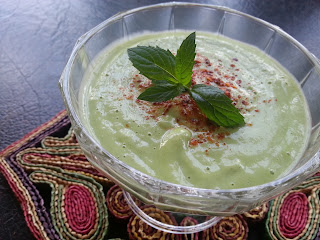I never grew up eating East Indian
paranthas, and I certainly never thought I'd have to make one. Of course, that wasn't gonna fly after I married a Punjabi. My first attempt was a disaster - the stuffing burst out of the dough and the parantha itself resembled a map of Ireland. I may have cried a little. Five years later, I'm relieved to say that I have finally overcome this culinary challenge, and I once overheard my husband telling my mom-in-law about the delicious parantha breakfast I had prepared one day - success!
There are two methods I use for stuffing my paranthas, but before I get to that, here are the measurements for the stuffings in this week's video:
Aloo Paneer Stuffing - makes approximately 4 paranthas
- 150 gm of paneer - crumbled
- 2 small potatoes - boiled and mashed
- 1 green chili pepper - finely chopped
- 1/2 an onion - finely chopped
- 2 tbsp of freshly chopped coriander
- 1 tbsp of whole cumin seeds
- 1 tsp of cumin powder
- 1/4 tsp red chili powder
- salt to taste
Mix all the ingredients together in a bowl and ensure that they are well incorporated. Small lumps are perfectly acceptable.
Patta Gobi Mattar - serves 4
- 2 cups of chopped cabbage
- 1 medium tomato - chopped
- 3/4 cup of defrosted green peas
- 1 medium onion - sliced
- 2 cloves of garlic - chopped
- 1 green chili pepper - finely chopped
- 1 tsp whole cumin
- 1 tsp coriander powder
- 1/2 tsp turmeric powder
- 1/4 tsp red chili powder
- 2 tsp canola oil or any other vegetable oil of your choice
- salt to taste
- fresh coriander for garnish
Please note that Patta Gobi Mattar is a cooked subzi (vegetable dish). I typically use the leftovers to make my paranthas. The subzi should be prepared like this.
Working with different stuffings has taught me that not all paranthas are created equally. The most popular way to stuff a parantha is to roll out a thick chapati, spoon some stuffing into the centre, gather the outer edges, and pinch them together in the form a large dumping. This method works well with aloo, paneer, finely chopped onion, or any combination thereof. Rolling out the parantha presents few challenges and a round shape and be easily achieved.
For certain stuffings I have found the sandwich method to be most effective. This involves rolling out two very thin chapatis, spreading the stuffing on top of one, and covering it up with the other. This works best with radish, cauliflower, and any leftover subzis. The only drawback to using this method is that in the rolling phase, the parantha can (and mostly does) become extremely large. This, however, may not be a bad thing.
Finding your stuffing method can take time and practice, but eventually you will find a way that works best for you. Please check out
this week's video to see the action!



